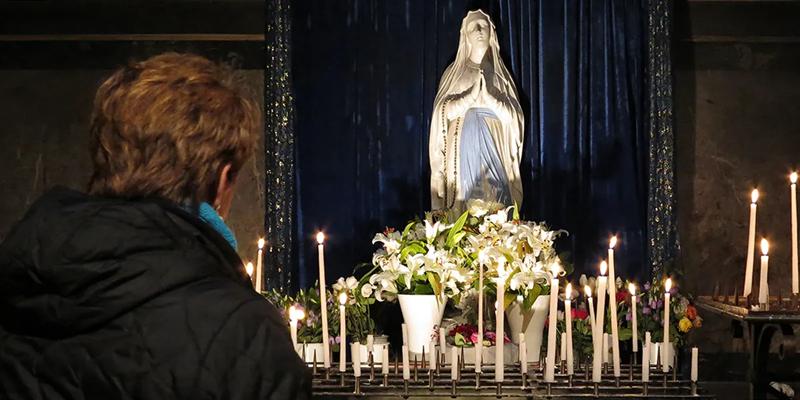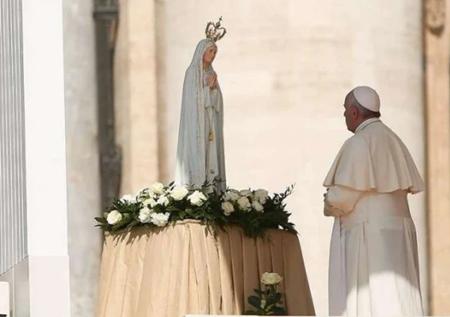Praying: To Mary or To Christ?
Praying: To Mary or To Christ?

Consider for a moment these scenes. The first is in a Roman Catholic Cathedral where a junior high teacher leads a handful of his students on a tour. The students speak in awed whispers of the beautiful stained-glass windows and of the statues, pictures, and ornate fixtures that fill the church. Suddenly the group is drawn up short and all fall silent. They have come upon a statue (idol) of Mary. But that is not what started them. Rather it is the sight of a gray-haired, devout woman, on her knees before the statue, bowed in humble adoration and prayer to MARY!
The second scene is in the humble village of Lion in Nicaragua, predominately a Roman Catholic village. The people are celebrating the annual feast of the Immaculate Conception of Mary [that Mary was born without sin]. A Roman Catholic describes (with approval) what he experienced there.
We walked for about an hour and a half in a poor and crowded part of the city… and in every hut there was a statue of the Virgin with candles, and a crowd would stop at each house and it was a kind of ritual; they would call out 'Who has given us happiness?' And the reply would come from the crowd, 'Mary Immaculate!'1
Many more pictures you may have seen yourself. Occasionally the news media will carry stories about how thousands of people gather at a certain spot nightly because someone claimed to have seen a lighted picture of the virgin Mary miraculously appear on a wall. At another location a man claims an infirmity was healed by the Virgin Mother! Still others insist they have experienced spiritual renewal through a visit to a special shrine of Mary.
These scenes all indicate the place the virgin Mary has in the lives and theology of the Roman Catholic Church. The more careful modern Roman Catholic writers who try to answer Protestant objections to these teachings must scramble to cover the tracks of Rome's doctrines and practices concerning Mary. They claim that the adoration (worship) given to Mary is different from that given to God. They admit that excesses have appeared in history and exaggerated claims of Mary's power have been made. But the bottom line for Rome is still that without Mary there is no salvation. One of the most significant aspects of this exaltation of Mary is that she is still “invoked in the [Romish] Church under the titles of Advocate, Helper, Benefactress, and Mediatrix.”2 [A mediatrix is simply a female mediator.] In effect the Roman Catholic Church sets aside the mediating work of Christ and replaces it with the work of Mary.
Rome of course denies that she has done this. Her theologians defend even the title “Mediatrix of all Graces” for Mary as follows:
This designation in no way excludes or even obscures the fact that Jesus Christ is the sole mediator. It means to express only that Mary, with her 'Yes' [i.e., her submission to God's will in the birth of Christ – RJD], has accepted on behalf of all the coming of this mediator of all graces, so that Jesus' mediation of salvation is permanently accompanied by her intercession.3

Rome argues that because Christ (and thus salvation) came through Mary, we must go to Christ (and this salvation) through Mary. Thus they insist Christ is still the One Mediator Who stands between God and man; but Mary stands between Christ and man.
The reason for this “mediatrix,” according to Rome, is that Mary is closer to us in our suffering. She is the Mother of Sorrows. She experienced horrible disappointment, pain, and sorrow because of the suffering and death of Christ. Mary can be counted on to be sympathetic. In addition, she is the mother of Christ. She has His ear. He will never turn down a request from His own blessed mother! This is captured in one of many approved form-prayers and songs written for Mary.
O most blessed and afflicted Virgin, Queen of Martyrs, who didst stand generously beneath the cross, beholding the agony of thy dying Son; by the sword of sorrow which then pierced thy soul, by the sufferings of thy sorrowful life, by the unutterable joy which now more than repays thee for them; look down with a mother's pity and tenderness, as I kneel before thee to compassionate thy sorrows, and to lay my petition with childlike confidence in thy wounded heart. I beg of thee, O my mother, to plead continually for me with thy Son, since He can refuse thee nothing, and through the merits of His most sacred Passion and Death, together with thy own sufferings at the foot of the cross, so to touch His Sacred Heart, that I may obtain my request. [Here the specific requests are given. (RJD)] For to whom shall I fly in my wants and miseries, if not to thee, O Mother of mercy, who, having so deeply drunk the chalice of thy Son, canst most pity us poor exiles, still doomed to sigh in this vale of tears? Offer to Jesus but one drop of His Precious Blood, but one pang of His adorable Heart; remind Him that thou art our life, our sweetness, and our hope, and thou wilt obtain what I ask, through Jesus Christ our Lord. Amen.4
Such a prayer makes a Reformed believer shudder. It ought to drive us to our knees in thankful acknowledgment of God's grace manifested in the Reformation and in our lives. But for the grace of God, we would be on our knees, praying to Mary.
Over against this, the Scriptures nowhere give to Mary the role of Mediator. Certainly, as the one chosen and prepared by God to be the mother of Jesus according to the flesh, she was “highly favored” and “blessed … among women” (Luke 1:28). But this does not make her the “Mother of the Church” or the “gate of heaven.” The Bible does not emphasize Mary's role in Jesus' public ministry or in the work of the church after His death. Nowhere in Scripture are we encouraged, much less commanded, to go to God or Christ through Mary.
The only Mediator between God and His people is Jesus Christ, His Son. That the Bible is so clear on this makes one realize how blind the Romish Church is to God's Word. Jesus is plainly identified as the only Mediator in 1 Timothy 2:5; – “For there is one God, and one Mediator between God and men, the Man Jesus Christ.” He is referred to three times in Hebrews (Hebrews 8:6; Hebrews 9:15; Hebrews 12:24) as the mediator of the covenant. No one else (except Moses as a type of Christ) is given this title in Scripture, and there is not a single incidence of prayer being offered to Mary or any other saint. Christ is the only Mediator.
The fact is that Jesus is the perfect mediator. He is the one eternally ordained by the Father to be the Mediator of the covenant, a priest forever after the order of Melchisedec (see Hebrews 7). He was anointed with the Holy Spirit to fill the office of prophet, priest, and king (Luke 4).
Not only that, but the two natures of Christ united in one Person make Him the perfect Mediator. He is eternally God, of one essence with the Father and Spirit. Knowing God, His will, and counsel, Christ is able to bring the prayers of His people into perfect harmony with God's will. But He is also very man. He knows the nature of man and is united to His people by the common nature. Who could better present our needs to the Father than the Mediator Who is one with us?
Further, Jesus is the perfect Mediator because He made mediation between God and man possible. The work of Satan in the garden of Eden violated God's relationship of friendship with Adam. The sin of Adam caused a horrible breach, bringing hatred between God and man. God cannot fellowship with iniquity. But all men are born dead in sin, by nature the children of wrath, unwilling and unable to make any attempt at reconciliation. And so the just wrath of God would have remained on all men forever had not God sent His Son, the Mediator, to remove the offense – our sins – by the atoning suffering and death of the cross. Paul explained the same to the Ephesians. Through that work, we, who “were without Christ, … strangers from the covenants of promise, having no hope, and without God,” are “in Christ Jesus…made nigh by the blood of Christ” (Ephesians 2:12, 13). He established peace between God and His people. And, Paul concluded, “through him [Christ] we … have access by one Spirit unto the Father” (18).

Thus Christ removed the sins which separated us from God, established peace, reconciled us to God, and continues to make intercession for us even now. How wonderful for us, that the very One Who made the payment for our sins pleads before the Father to give us the forgiveness of sins (1 John 2). We can shout with confidence,
Who is he that condemneth? It is Christ that died, yea rather, that is risen again, who is even at the right hand of God, who also maketh intercession for us.Romans 8:34
This work of Jesus is an unending intercession which results in the sure salvation of all those who “come unto God by him” (Hebrews 7:25). The fact is, Jesus is the only way to God. He Himself said,
I am the way, the truth, and the life: no man cometh unto the Father, but by me.John 14:6
But there is one more very real concern for the child of God which he faces daily, every time he begins to pray. Do I dare to come to Jesus? He is, after all, very God; He is the sinless One, the righteous Judge. Would it be better to go to His mother Mary, a woman of compassion, and ask her to bring my request to Jesus? Rome's arguments do strike a responsive chord in our souls. But this is a wicked response, not the response of faith.
To pray to Mary not only denies Scripture, it rejects Jesus the merciful high priest. Our Lord is merciful. How often does not the Bible record Jesus' compassion on the multitudes or on the sick and demon-possessed? How compassionately He dealt with publicans and sinners, with the woman caught in adultery, and with Peter after his denial of Christ!
Besides, all the suffering of this life prepared Him to be our merciful and faithful high priest! From personal experience He knows our struggles with doubt, trial, temptation, and all forms of human suffering. “For we have not an high priest which cannot be touched with the feeling of our infirmities; but was in all points tempted as we are, yet without sin” (Hebrews 4:16). No one in heaven or on earth is more compassionate than our Savior! How foolish, how devilish, to put aside the mighty, glorious, compassionate Mediator and substitute one of our own making.
Let us therefore (in Christ!)' come boldly unto the throne of grace, that we may obtain mercy, and find grace to help in time of need.Hebrews 4:17

Add new comment